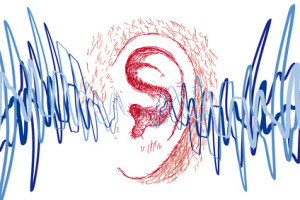 Tinnitus is a syndrome in which the affected person perceives noises, usually a whistling or ringing sound in their ear. This condition can be classified as either subjective or objective. In the case of objective tinnitus, it’s possible for a clinician to perceive and measure the noise. Conversely, subjective tinnitus isn’t measurable and noise can only be heard by the patient.
Tinnitus is a syndrome in which the affected person perceives noises, usually a whistling or ringing sound in their ear. This condition can be classified as either subjective or objective. In the case of objective tinnitus, it’s possible for a clinician to perceive and measure the noise. Conversely, subjective tinnitus isn’t measurable and noise can only be heard by the patient.
Tinnitus may impact one ear or both ears. It can arise in the middle ear, outer ear, inner ear, and sometime from abnormalities in the brain. The associated noise competes with external sounds, decreasing hearing ability. The condition can be intermittent or continuous. For many people, tinnitus is temporary. In situations where the symptoms last for over three months, tinnitus is classified as chronic and is usually representative of a more serious health issue.
Between 10 and 20 percent of the adult population suffers from tinnitus. The prevalence of the condition is much higher in older people, affecting men and women equally.
Causes of tinnitus
 There are a wide range of triggers for tinnitus, including various diseases of the inner ear or the auditory pathway.
There are a wide range of triggers for tinnitus, including various diseases of the inner ear or the auditory pathway.
The common causes of objective tinnitus include:
- Vascular disorders and malformations
- Eustachian tube dysfunction
- Palatal nystagmus
The common causes of subjective tinnitus include:
- Acoustic trauma
- Inflammation of the ear (middle ear or outer ear)
- Sudden hearing loss
- Diving accidents
- Corsten’s syndrome
- Cochlear Hydrops
- Autoimmune diseases of the inner ear
- Superior canal dehiscence syndrome
- Meniere’s disease
Consequences of tinnitus
Tinnitus is very disruptive. It can interrupt sleeping patterns and lead to anxiety and depression. It can also interfere with the capacity to work.
Treatment of tinnitus
 In most instances there’s no specific treatment for tinnitus. Often it goes away of its own accord, although some people may have to put up with tinnitus indefinitely. There have been a range of pharmaceutical drugs developed to help reduce the severity of the condition, although these medications are unable to cure tinnitus and often have undesirable side effects.
In most instances there’s no specific treatment for tinnitus. Often it goes away of its own accord, although some people may have to put up with tinnitus indefinitely. There have been a range of pharmaceutical drugs developed to help reduce the severity of the condition, although these medications are unable to cure tinnitus and often have undesirable side effects.
There is evidence to suggest that certain plant extracts, amino acids, vitamins and minerals can help to treat tinnitus. In particular, vitamin C, E and B complex, calcium, zinc and magnesium have been found to be helpful. Also, antioxidants in the form of isoflavones can assist with the regeneration of nerve cells and may help to decrease the symptoms of tinnitus.
The amino acid L-arginine and extracts from the Ginkgo biloba plant are considered very beneficial for resorting audibility. Both these compounds improve blood circulation, increasing oxygen and nutrient availability within the ear. This can speed up the healing process for damaged nerves. Anyone suffering from tinnitus is encouraged to maintain a healthy diet and consider a quality supplement.
